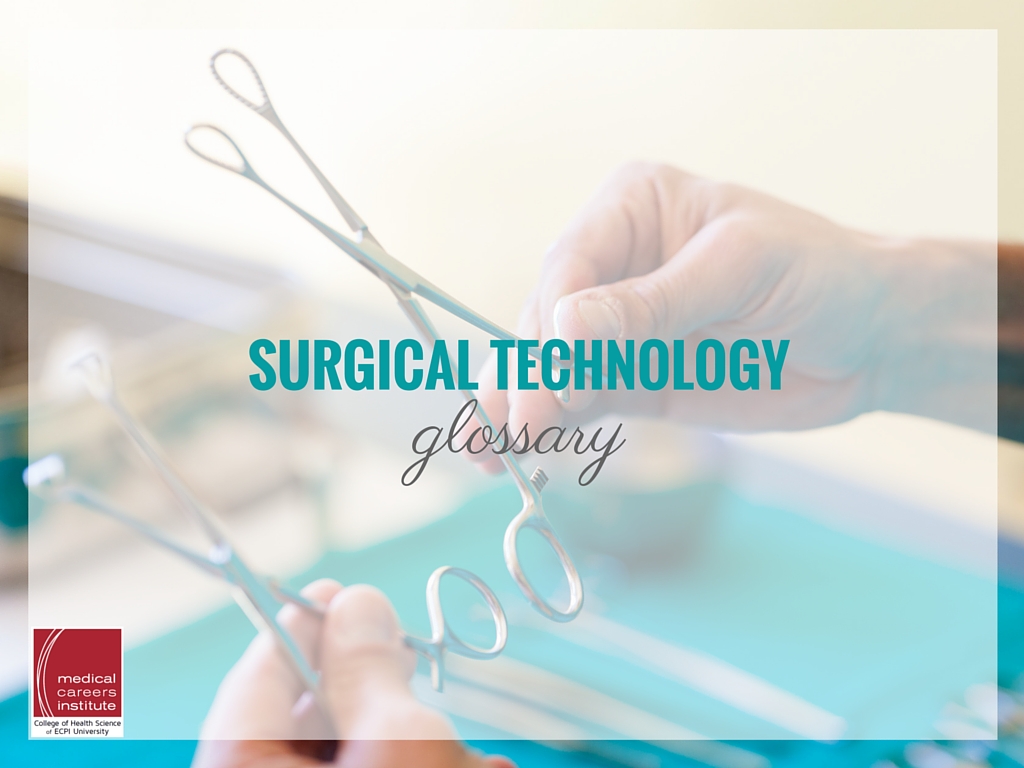
Surgical Technology Glossary: Important Terms for Surgical Techs
So you've seen medical dramas like Grey's Anatomy, General Hospital, and House, and marveled at the miracle that is modern medicine. And while you might not feel up to the task of playing the surgeon, you like the idea of being part of the supporting cast. There are many exciting roles at a hospital, and none more essential than a surgical technician.
What Is A Surgical Tech?
Surgical technicians are allied health professionals, those who follow the principles of medicine but are trained to have different skills than a doctor or nurse. Like all health professionals, surgical techs are expected to perform with surgical conscience, meaning they must be honest about their actions and mistakes. Surgical technicians can be split into two groups:
- A circulator is part of the non-sterile operating team. They monitor the conditions in the operating room to ensure it and the other personnel remain sterile, such as distributing supplies to the sterile personnel. They also deal with relevant documentation, as well as some patient care, such as speaking with the family outside of the operating room during surgery.
- A scrub is part of the sterile personnel. Sterile personnel are those that performed a surgical scrub to sanitize themselves, as well as wearing sterile outfits and gloves. The sterile personnel include the surgeon, assisting nurses, and the surgical technicians.
Scrubs serve a vital role in the operating procedure. They make sure every tool required for the operation is on hand and sanitized, they are the ones who hand the surgeon their tools during the operation, and they are the ones who dispose of needles and gauze, making sure the operating room does not pose an infectious risk to the patient. After the operation they account for all instruments and sterilize everything.
Surgical techs can also have hands-on roles in the operating room. Such tasks include assisting in tissue extraction and suturing the patient.
Finally, surgical technicians are expected to be quick thinking and versatile. It is up to the surgical techs to handle any situations that arise to ensure that the operation continues successfully.
Tools of the Trade
Although surgical techs are not the ones typically wielding the tools, they are responsible for knowing each of them and what they are used for. And while some may seem obvious and simple, there are many variations. Some of the most recognizable surgical instruments are:
- Scalpels are finely sharpened blades used for making incisions. While everyone is familiar with them, there are different numbered blades as well as different numbered handles that match. One such scalpel blade is 15C, a small downward angled blade favored during cardiac operations.
- Forceps are hinged objects used to grasp and hold objects. There are used when objects are too small to be held manually or there are too many things that need to be held at once. Forceps is an umbrella term that includes objects such as tweezers and clamps. One specific type of forceps is a hemostat, which include Kelly forceps and Mosquito forceps. These types of forceps deal specifically in the occlusion of blood vessel, preventing bleeding.
- Retractors are objects used to separate an incision or keep superficial organs out of the way so that underlying organs can be reached. There are also retractors not used in surgery but for examinations. The most commonly known retractor of this kind is the speculum, a medical apparatus used in vaginal examinations.
Medical Text Speech
There is a running joke that a doctor's handwriting must become more illegible the better they become. But there is a simple fact that medical professionals, surgical technicians included, write in an almost unintelligible shorthand. Becoming a surgical tech means learning all the abbreviations, and knowing the difference between CSF (cerebrospinal fluid) and CS (Caesarean section). A few terms include:
- FB: Apart from being a social media site, FB is short for foreign body, that is, any object that has accidentally found its way inside the body. They can be something as innocent as some cotton from a Q-tip to something as harmful as bullets or shrapnel.
- SOB: Once again an amusing abbreviation that means something completely different inside a hospital. SOB stands for shortness of breath, which can be a symptom of anything from allergic reaction to lung cancer.
- Bx: short for a biopsy, in which tissue is removed in order to test for diseases. This can be fluids extracted from cysts or an excised portion of a larger organ.
Interested in changing your life and saving others? ECPI University is offering you a chance with their Associate of Applied Science in Surgical Technology. Learn about all the devices and procedures needed to assist both doctors and patients. And with ECPI University's year-long program, you could be helping people in as little as eighteen months! It could be the Best Decision You Ever Make!
This is it! After today I will be a graduate of ECPI University with my Associates of Applied Science in Surgical... http://t.co/qyxUfKvvql
— Leon Mendenhall (@Im_Da_Real_Leon) April 3, 2014
DISCLAIMER – ECPI University makes no claim, warranty, or guarantee as to actual employability or earning potential to current, past or future students or graduates of any educational program we offer. The ECPI University website is published for informational purposes only. Every effort is made to ensure the accuracy of information contained on the ECPI.edu domain; however, no warranty of accuracy is made. No contractual rights, either expressed or implied, are created by its content.
For more information about ECPI University or any of our programs click here: http://www.ecpi.edu/ or http://ow.ly/Ca1ya.


